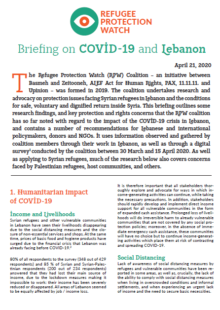COVID-19 in Lebanon: Impact on Refugees and Host Communities
November 29, 2020
Research by the “Refugee Protection Watch” that outlines concerns and recommendations regarding the COVID-19 crisis in Lebanon
Download 314.13 kb
Research by the “Refugee Protection Watch” that outlines concerns and recommendations regarding the COVID-19 crisis in Lebanon: covering its impact on the humanitarian situation, issues regarding discrimination against refugees, its impact on human rights and the work of civil society. The research includes a set of recommendations to Lebanese and international policy-makers.
The research by the “Refugee Protection Watch” coalition –PAX, Basmeh & Zeitooneh, ALEF – Act for Human Rights, 11.11.11 and Upinion – uses information observed by coalition members through their work in Lebanon, as well as through a digital survey among 429 Syrians, Syrian-Palestinians, Lebanese, and Palestinian-Lebanese respondents.
Some of the key findings in the briefing are:
- The impacts of COVID-19 and associated restrictions on refugees’ and host communities incomes are severe: 80% of all respondents to the survey and 85% of Syrian and Syrian-Palestinian respondents answered that they had lost their main source of income, due to the lockdown measures making it impossible to work.
- There are concerns and fears regarding discrimination against refugees: Discrimination regarding public health measures such a curfews and movement restrictions could have a very negative impact on the human rights of refugees, as well as threaten the efficacy of these emergency measures. The principle of non-discrimination must guide all restrictions and all access to healthcare alike.
- Local civil society are key: Local civil society are of central importance in all parts of an effective emergency response to COVID19. Their work on human rights and peacebuilding issues – which predate and are exacerbated by he crisis – is also crucial at this time.
- Human rights and civic space should be protected: The necessary restrictions put in place reduce the impact of COVID-19 should not lead to backsliding on human rights or restrictions on dissent.
- Many respondents don’t have access to hygiene materials, or aid: 85% of respondents reported that they do not have access to or the possibility to buy sufficient sterilization and hygiene materials. Amongst Syrian respondents this figure was 89%. When respondents were asked if they had received any help in the form of food rations, sterilization and cleaning materials, only 4.5% responded saying that they had received some aid.
- Need for more and clearer information: The research notes lack of clarity regarding lockdown policies in Lebanon, as well as information gaps. The survey finds that 42% of respondents are not aware of a COVID-19 hotline they can contact if they suspect having contracted the virus. 38% of respondents said they would like to receive more information on COVID-19 in the coming weeks, which they can then further spread to their communities.





